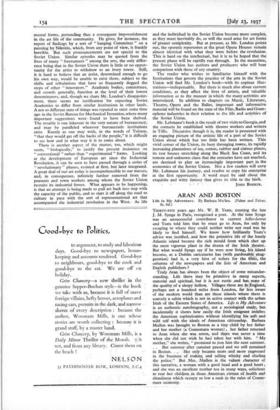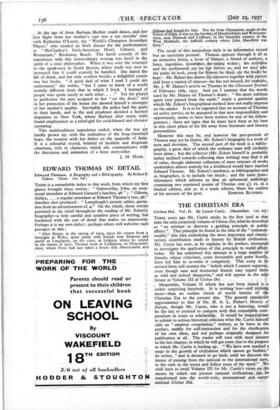ARAN AND BOSTON
THIRTY-FIVE years ago Mr. W. B. Yeats, meeting the late J. M. Synge in Paris, recognised a• poet. At the time Synge was an unsuccessful contributor to current belles-lettres and Yeats told him that he must go to Aran, for only by escaping to where they could neither write nor read was he likely to find himself. We know how brilliantly Yeats's advice was justified, and how the primitive life of the lonely Atlantic island became the rich mould from which shot up the most vigorous plant in the drama of the Irish theatre. But what would Synge say if he were now living, his island become, as a Dublin caricaturist has (with pardonable exag- geration) had it, a very hive of toilers for the fiatis, the columns of the newspapers and the lists of American and English publishers ?
Truly Aran has always been the object of some misunder- standing. Life there may be primitive in many aspects, material and spiritual, but it is not rustic .and has none of the quality of a sleepy hollow. Villages: thereare in England, perhaps not a hundred miles from London, far less 'aware of the modern world than are these islands where there is scarcely a cabin which is not in active contact with the urban Irish of the Eastern States of America. Life is My Adventure is an authentic autobiography, not a sociological study, but incidentally it shows how easily •the Irish emigrant imbibes the American sophistication without identifying his soft and wild self with the ideals of American citizenship. Barbara Mullen was brought to Boston as a tiny child by her father and her mother (a Connemara woman) , her father returned to Aran when she was seven, and there was never a time when she did not wish he had taken her with him. " My mother," she writes, " promised to jom him the next summer. . . But summer after summer passed and we still remained in Boston. . . She only became more and more engrossed in the business of making and selling whisky and eluding the police." But Mrs. Mullen is the valiant character of this narrative, a woman with a good head and a good heart , and she was an excellent mother too in many ways, solicitous to rear her children in those American, virtues of health and cleanliness which occupy so low a rank in the rules of Conne- mars economy. At the age of three Barbara._Mullen could, dance, and _het first flight from her mother's care was a ten months' tour: with Katherine O'Leary, the " World's Champion Accordion Player," who needed an Irish dancer for the performances at " McCluskey's Irish-American Hotel, Cabaret, and Restaurant," Rockaway Beach.. The harsh comedy of her experience with this extraordinary worn= was faced in the spirit of a stoic philosopher. When it was over she returned to the speak-easy in South Boston, where trade was now -so increased that it could scarcely be handled. She hated the life of drink, and her only comfort besides a delightful cousin was her books. " A good deal of what I read I could not understand," she writes, " but I came to know of a world entirely different from that in which I lived. I learned of people who spoke nicely to each other. . . ." Yet she played to perfection the part assigned to her " on the door," and:i in her protection of the house she showed herself a strategist. of her mother's quality. Inevitably the police had the game in their hands, and in the end prudence dictated a hurried migration to New York, where Barbara after many trials found employment as a relief-girl for switchboard and elevator operating. This multitudinous experience ended, when she was yet hardly grown up, with the realisation of the long-cherished hope, the reunion with her father on the quayside of Atan. It is a colourful record, brimful of incident and desperate situations, rich in character, which she communicates with the directness and animation of a born story-teller.
J. M. HONE.































































 Previous page
Previous page